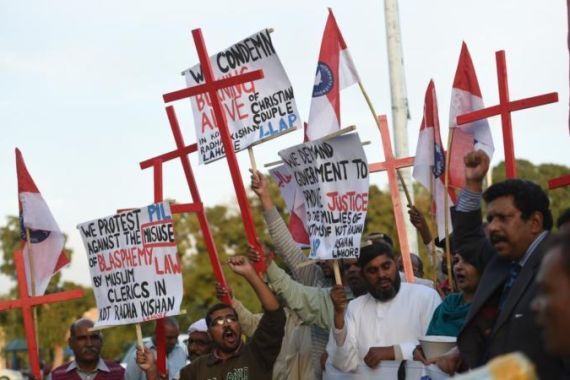Pakistani Christian couple killed by mob
Shahzad and Shama Masih accused of desecrating Muslim holy book, then beaten and burned to death in Punjab village.

Islamabad, Pakistan – A young Christian couple have been beaten and then burned to death by a mob in a small Pakistani village in Punjab province, after being accused of desecrating the Muslim holy book, police and rights activists have told Al Jazeera.
Shahzad Masih and his wife Shama were killed in the village of Kot Radhakishan, about 55km south of Lahore, the provincial capital, on Tuesday, Muhammad bin Yameen, a local police official, told Al Jazeera.
Keep reading
list of 4 itemsPalestinian Prisoner’s Day: How many are still in Israeli detention?
‘Mama we’re dying’: Only able to hear her kids in Gaza in their final days
Europe pledges to boost aid to Sudan on unwelcome war anniversary
“There [were allegations] that they had desecrated the Quran yesterday, and then when people found this out, they got together to form a mob,” he said.
“There were a lot of people gathered there, from many of the surrounding villages as well.”
Shahzad and Shama locked themselves in a room, but the mob of dozens of villagers broke through the door and beat them “with fists and sticks”, Yameen said.
He said that police had attempted to stop the mob, but had been outnumbered.
The mob then dragged the couple’s bodies to a nearby brick kiln, where they burned them.
It is unclear whether Shahzad and Shama were alive at the time of being thrown in the kiln, according to Nadeem Anthony, an investigator with the Human Rights Commission of Pakistan (HRCP), but the evidence points to them being severely injured but still breathing.
Anthony, who visited the site on Wednesday, said the attack on the couple was instigated using local mosques at the behest of a local brick kiln owner, over a monetary dispute amounting to approximately Pakistani Rs100,000 (US$ 970).
“Let me be clear that there was no burning of the Quran there. I can say this categorically,” Anthony told Al Jazeera, explaining that Shama had burned some paper with Arabic writing on it worn as a taveez [a local charm], not verses of the Quran.
“People said that there was still some life in them when they were thrown into the kiln to be burned.”
‘Vicious mob justice’
Local police said on Wednesday that 45 people had been arrested in connection with the attack, and that they were now seeking judicial remand orders from a magistrate.
A case had been filed under multiple sections of Pakistan’s Penal Code, Yameen said, including murder and attacking police officials.
Pakistan’s blasphemy laws, which prescribe harsh punishments for crimes including the desecration of the Quran or insulting Prophet Muhammad, have often been used as cover for mob justice, says David Griffiths, Amnesty International’s deputy Asia-Pacific director.
“This vicious mob killing is just the latest manifestation of the threat of vigilante violence which anyone can face in Pakistan after a blasphemy accusation – although religious minorities are disproportionately vulnerable,” he said in a statement on Tuesday’s attack.
Since 1990, more than 62 people have been extrajudicially killed in relation to blasphemy cases, according to the Islamabad-based Centre for Research and Security Studies (CRSS).
Attacks on Pakistani non-Muslim minorities, which include Christians, Hindus and Sikhs, as well as a small number of other faiths, are common in Pakistan, say rights activists.
Since 1990, at least 147 Christians have also been killed in targeted attacks on the religious minority, which forms less than two percent of Pakistan’s population, according to the Centre for Legal Aid Assistance & Settlement (CLAAS) and media reports.
In September 2013, 127 people were killed in twin suicide bombings on a church in Peshawar, the largest ever such attack on Christians in Pakistan.
Earlier, in March 2013, a Christian locality in Lahore was burned down by a mob over allegations a local Christian had committed blasphemy.
The man was convicted of having committed blasphemy on March 27 this year, while those who burned the locality remain at large, HRCP activists told Al Jazeera.
‘Police standing by’
Last year, there were 39 blasphemy registered against a total of 359 people, according to the HRCP.
Attacks such as the one in Kot Radhakishan are growingly worryingly common, says Zohra Yusuf, chairperson of the HRCP.
“They seem to be more and more frequent and the tragic part is the fact that the law is being taken into the hands of mobs, they are not letting the system really work. Apart from that, in several cases we have seen the police standing by and not helping the victims,” she said.
Seventeen people are currently on death row in cases related to blasphemy, with a further 19 serving life sentences.
Among those on death row is Aasia Bibi, a Christian woman convicted of having insulted the Prophet Muhammad after a dispute over drinking water in the village of Ittan Walli, about 50km from Lahore.
Three weeks ago, a Pakistani court upheld the death penalty verdict in her case.
Bibi’s case was taken up by high-profile advocates such as Salmaan Taseer, then Punjab governor, and then Shahbaz Bhatti, federal minister for minorities, both of whom were killed in 2011 in targeted attacks for supporting Aasia and recommending amendments to the blasphemy law.
Even those convicted of blasphemy often remain under threat, lawyers told Al Jazeera.
In the latest such case, on Sept 25, Muhammad Asghar, 70-year-old paranoid schizophrenic man convicted of blasphemy in January was shot by one of his police guards while incarcerated at a Rawalpindi jail. He continues to recover at a medical facility under strict security, his lawyers told Al Jazeera.
“Consistent failure by the government to tackle violence in the name of religion has effectively sent the message that anyone can commit outrageous abuses and excuse them as defence of religious sentiments,” said Griffiths.
Follow Asad Hashim on Twitter: @AsadHashim